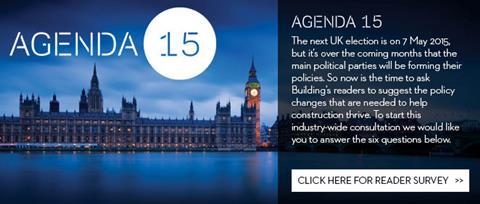Sir John Armitt’s recent report suggests we need a long-term infrastructure programme that exists beyond the whims of changing governments. Building’s Agenda 15 initiative could give the industry a chance to make this a reality

As I huddled over my keyboard at New Year to write this column, it occurred to me that the festive break is an important time of year. Don’t worry, I’m not about to start waxing lyrical over the importance of time spent with family or the history of the bauble. It is important because most of us get a chance to pause from whatever it is we usually do for at least a few days. It’s an opportunity to think beyond to-do lists, deadlines or the next crisis. We make resolutions that the best of us keep for about nine days, before our usual routines take over.
The UK construction industry might be accused of following a similar pattern. In periods of calm we come up with great ideas and initiatives but business soon reverts to normal, carried on (or struggling under) the wave of economic activity. Is there something about the nature of this industry that will forever consign it to boom followed by bust, or can we make and keep a resolution to drive real change?
That is the challenge behind Building magazine’s Agenda 15. The risk is that between us we come up with dozens of things we would like to see happen, some of them contradictory. This is not an industry that lacks views or the means to have them heard; it is an industry that lacks consistency of message.
So in looking to the next election and beyond we must think bigger and more strategically. The opportunity today is to press all our political parties to help create the foundations of a successful, sustainable industry - an industry that is much more than the sum of individual projects.
At present our political parties are struggling to reconcile the competing demands of investment and affordability. Looked at through the short-term lens of politics, a focus on cost-saving makes perfect sense.
But if we take a long-term view this approach is not just reckless but dangerous - to the health of our economy and to the prosperity of both ourselves and future generations.
That politics is inherently bad for infrastructure was the starting point of Sir John Armitt’s report. Sadly our politicians were oblivious to the irony when they engaged in an orgy of political positioning over infrastructure within days of its publication
A long-term focus is key to creating a stable construction industry. If we invest wisely, our projects will create wealth and, hence, future affordability. In the future we will be able to afford many times what we can afford today. If we don’t believe that then we commit ourselves to economic decline.
That politics is inherently bad for infrastructure was the starting point for Sir John Armitt in his recent report. But sadly our politicians were oblivious to the irony when they engaged in an orgy of political positioning over infrastructure within a matter of days of its publication. As the affordability of energy bills and HS2 rose to the top of the political agenda, the cross-party consensus on the value of infrastructure investment went out of the window. It was encouraging to hear the chancellor defending investment in both HS2 and fracking in his Autumn Statement, but in the current political climate we all know such positions are fragile.
The Armitt report addresses the key challenge of trying to embed long-term thinking about infrastructure into our short-term democratic system. It concludes that you cannot circumvent the existing parliamentary machinery, but have to embed within it processes that give a longer-term view a fighting chance.
His proposed Infrastructure Commission would create an environment in which the right data is assembled, the right questions are asked and the opportunities and trade-offs evidenced. It would then fall to individual government departments to bring forward plans to meet the future infrastructure needs of the country. This would work well with the grain of civil service culture, which likes to problem solve.
An Infrastructure Commission would not take the politics out of infrastructure, but it would help parliament give greater weight to the value of the future over the value of today. Ultimately, it would drive a long-term approach to infrastructure planning, creating a more predictable climate for UK construction and supporting investment in skills, technology and production capacity.
Unfortunately the very concept of an Infrastructure Commission challenges the status quo; hence the irony that we will need strong political will to set it up.
That is why the biggest prize for the construction industry today is to get all political parties to accept the principles of the John Armitt review and sign up to implement it. If we keep our shopping list short and consistent, there is a chance we might see a real change for the future of this industry.
Richard Threlfall is head of infrastructure, building and construction at KPMG

























2 Readers' comments